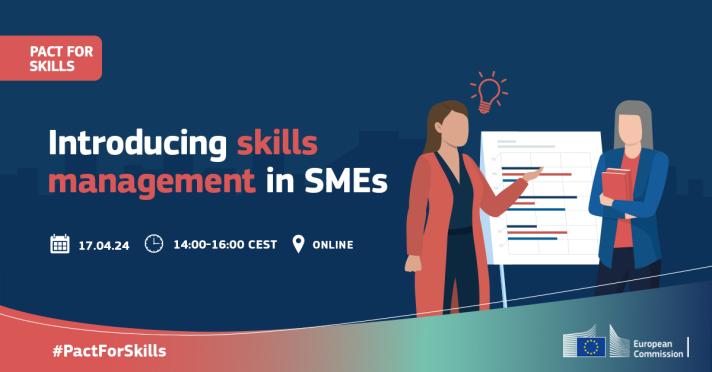Background and objectives
Small and medium-sized enterprises (SMEs) are the backbone of EU’s economy, representing 99% of all businesses in the EU, and employing around 85 million people1. As such, SMEs have the potential to play a crucial role in contributing to the upskilling and reskilling of the European workforce.
At EU level, a number of policy instruments aim to support companies, including SMEs to respond to skills needs and tackle skills shortages. From the European Skills Agenda – an over-arching EU strategy for developing more and better skills across Europe – to the European Pillar of Social Rights and its Action Plan, aiming to ensure that at least 60% of all adults will be participating in training every year by 2030, the European Commission has set the policy framework to promote upskilling and reskilling, including at company level. Moreover, the EU’s SME Strategy for a sustainable and digital Europe aims to strengthen SMEs' capacity to respond to the twin transition, including by addressing changing skills needs, while the Single Market Programme provides various types of support to SMEs to facilitate access to markets, promote entrepreneurship, and address global and societal challenges. Furthermore, in 2022, the European Commission published a study exploring the state of play with regards to skills management in SMEs, providing an overview of existing skills solutions and tools available on the market and which SMEs could use, and exploring the potential for the development of a self-assessment tool. Finally, EU level initiatives such as the Pact for Skills can help SMEs grow their staff and attract new employees with the skills they need by mobilise stakeholders and incentivising concrete action for the upskilling and reskilling of people of working age.
SMEs’ ability to thrive relies heavily on the skills and competencies of their workforce. To this end, effective skills management is essential for SMEs to remain agile, innovative, and competitive in the market. However, from more limited financial resources affecting investment in upskilling and reskilling, to greater difficulties in reacting to changes in the labour market and new skills gaps, SMEs face greater challenges compared to larger companies in accessing and retaining skilled labour. To this end, encouraging SMEs to ensure skills management becomes part of their organisational culture and can therefore influence resource management and capacity planning, is crucial.
This peer-learning activity will be an opportunity for Pact for Skills members to learn more about challenges and opportunities of introducing skills management in SMEs. At the event, Pact members will hear from experts, and will discuss with other stakeholders across Europe to exchange ideas and upscale good practices to further enhance upskilling and reskilling in their day-to-day work and better address current and future skills needs.
[1] See https://single-market-economy.ec.europa.eu/document/download/b7d8f71f-4784-4537-8ecf-7f4b53d5fe24_en?filename=Annual%20Report%20on%20European%20SMEs%202023_FINAL.pdf
Please click here to read our privacy policy.
- skills anticipation and matching | vocational training | updating of skills | employment policy | labour market
- Wednesday 17 April 2024, 14:00 - 16:00 (CEST)
- Event type
- Online training
- Event category
- Skills and qualifications
Practical information
- When
- Wednesday 17 April 2024, 14:00 - 16:00 (CEST)
- Languages
- English
- Website
- Register here
Related events
- Online only
- Event type
- Webinar
- Event category
- Skills and qualifications

